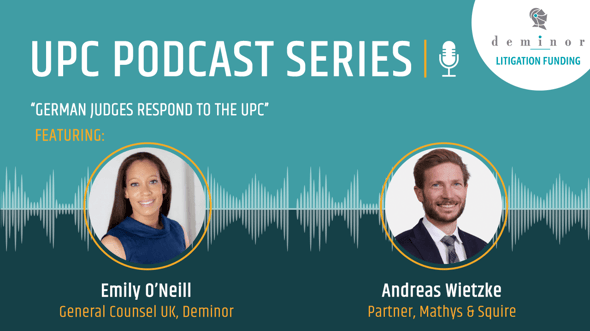In this podcast series, Emily O'Neill General Counsel UK and Global Intellectual Property lead for Deminor Litigation Funding, undertakes interviews with global professionals to understand the implications of the new Unified Patent Court (UPC).
Deminor welcomes you to join this conversation as we summarise the key elements of the conversations between Emily O'Neill and these experts, as captured in the podcast transcripts below.
What is the UPC?
The Unified Patent Court (UPC) is a new European court system designed to harmonise and simplify the patent dispute landscape in Europe.
The UPC was established in order to provide a unified patent enforcement system with jurisdiction over ratifying EU member states. Countries that are Member States of the European Patent Convention (EPC) but are not EU member states cannot join the Unitary Patent or Unified Patent Court. As a unified court with a multi-state jurisdiction, the UPC hopes to be faster, more efficient and more cost-effective in resolving patent disputes.
The UPC's structure is made up of a Court of First Instance that is divided into central, local and regional divisions. Its central divisions are located in Paris and Munich. The third seat of the central division was originally assigned to London. The Italian Foreign Office published a press release that an agreement has been reached with France and Germany to set up a branch of the Central Division in Milan. This agreement now needs to be approved by the other UPC contracting states during the next meeting of the Administrative Committee in June 2023. The press release states that the Milan court is in the process of being set up and will be operational within the next year. In the interim, the Presidium of the UPC decided, that initially, the Paris and Munich central division seats will share this caseload. Cases concerning human necessities are assigned to Paris and those involving chemistry and metallurgy to Munich for now.
The UPC’s Sunrise period launched on March 1st and allowed patentees to opt out of the exclusive jurisdiction of the new system to take effect from the court coming online on 1 June. Approximately 460,000 European patents and patent applications have been opted-out during Sunrise. Opt-outs are still possible now and at least during the 7-year transition period, unless proceedings are pending in the UPC, and will take effect once filed.
However, this is a new and untested forum, located in civil law jurisdictions but with elements of common law such as disclosure, cross-examination and adverse party costs. Notable jurisdictions such as the UK and Spain are not within the UPC - How will companies mitigate their commercial litigation risks in this environment?
Podcast Preface:
Deminor General Counsel UK, Emily O'Neill (EON), speaks with Andreas Wietzke (AW), Partner at Mathys & Squire with over 20 years of experience as a German Patent Attorney and a European Patent Attorney. Andreas focuses on the different aspects of obtaining, defending and enforcing national and international patents across a wide range of sectors including general industrial engineering, automotive technology, tool technology, aerospace, medical technology and telecommunication.
In this interview with Emily O’Neill, he provides his insight into the upcoming Unified Patent Court (UPC) and who will litigate there as well as how the German Judges will likely approach the new Court.
Podcast Transcript:
EON – Are your clients deciding to remain in or out-of the UPC? And is this sector dependent?
AW - I don't think that it's dependent on sector, I think it's dependent on the market and products. In addition, there are also several further legal aspects like knowledge about state-of-the-art documents, knowledge about validity. From what I see, the more my clients elaborate and work in preparation for the UPC, the more sophisticated their strategies will become. What they do more at the moment is to go through their portfolio and make up their minds on which parts of the portfolio are pro-UPC, and which ones to select for opting out.

EON - Are clients taking a hybrid approach, and what criteria are they applying? What are they thinking about as to the value of the UPC will be?
AW - I have not seen a specific line everybody is following right now. I think it's a very case-specific decision that needs to be made. Plus, at the moment, there is a lot of uncertainty about risks and opportunities.
I understand that the more my clients, and also we as a firm, elaborate and work with the UPC in preparation, we see that the opportunities are a lot bigger than the risks coming along with the centralised invalidity. Just to name a few things we are talking about, centralised damages, centralised injunctions, injunction threats if we are in negotiations, etc. The UPC gets more and more interesting the more you think about it and work with it.
EON - How do you see the UPC and the wider damages that you can receive in comparison with other European jurisdictions?
AW - I don't see that we are going in the direction of really high damages as we have in the US, but there are basically two things that work in favour of the UPC.
The one thing is that we have quite high predictability and calculation. Since this is all based on a license analogy, we are quite commonly using in German courts. In the German UPC divisions, we will probably have some kind of predictability on the number of damages to be expected.
And even more important, in my understanding, we are talking about damages for a huge market, and this is the big difference to the German litigation we are we are in right now. We are talking about damages for a market probably the same size as the US market. So even though we will not be able to reach the damages numbers we have in the US, we have a significant advantage in terms of predictability and in terms of market coverage.
EON – With damage calculations across the UPC being dependent on the breadth of patent validation across UPC countries, how broadly have you seen validations of current EP portfolios, and does that change by sector?
AW - The variation of validation, or validated countries, as far as I have seen it in the past, was dependent on market value. If a client or a patent holder gets an EP granted, they usually decide to validate in the valuable countries. If the validated countries are subject to the UPC and are valuable countries to the client, it might still be able to make use of the advantage of the centralised damages despite only validating its patents in a small number of countries.

EON – How predictable do you think the court will be?
AW - I don't think that we will have the same level of predictability as we have in Germany, which is probably one of the big advantages we have in the German system so far. But there are two things that the German judges, I believe, will apply even under the new rules.
The first one is the German pragmatic and kind of strict approach, they will stick to the law, they will try to interpret as little as possible and stick to the language of the legal texts. That's the legal prediction I would have.
The other one is that the German judges are quite good and known for their technical understanding. I think this is something which goes beyond the legal texts and beyond the rules that need to be applied. This is a legal expert, getting to the bottom of a technical problem that’s solved by an invention described in a patent. I think this is something very valuable, which is transferred not only from the German judges and from the German patent system, but from all the experienced judges all over Europe, may it be France, Italy, or wherever we are within the UPC.
EON – Do you think German judges are going to go with their national practice and bifurcate infringement and validity issues?
AW - I personally expect that every judge coming from Germany who has now the possibility to get rid of bifurcation will follow that way. Just because the German judges as far as I know them are quite a big fan of creating some kind of certainty from a legal perspective and the bifurcated system, resulting in an injunction gap usually doesn't lead to certainty for the parties, but it leads to uncertainty. So in short, I think the bifurcation if it is at the discretion of the judge, will be less commonly used.

EON – An ambition of the UPC is to be a fast court. Do you think this will make it quite claimant friendly?
AW – I believe it's going to be a fast court, and I personally believe it's going to be patentee friendly. But I'm not sure if they are connected to each other. I think being patentee friendly is almost a kind of a political question. Hence a new system will be a success if the potential users who decided to use the system, the patent holders in this case, see the benefit in using it over a different system. So this is why I believe there is at least a tendency to favor the patent holder. Of course, always under the legal texts and under the circumstances to apply a legally correct decision.
EON – There's been a lot of commentary that the wider market generated by the UPC could attract more NPE type cases. What are your thoughts on that?
AW – That's probably the case. If you look into risk and opportunity balance, if you are a patent holder or have a patent that protects your market or your product, you probably are more concerned about the threat of a centralised invalidity than an NPE holding a bunch of patents. All of them are quite valuable, and losing one of them might not have a similar negative effect in terms of level of negativity as compared to a product producing entity.
I do not agree with the fact that the UPC is built for having the NPEs flooding Europe right now. I see the opportunities coming along with the UPC are even as strong, if not even stronger, for regular companies and innovative patent holders.
EON – As the UK, because of Brexit, is no longer part of the UPC, what do you think the UK’s role will be in multi-jurisdictional campaigns going forward?
AW – I would make a distinction here. I think in terms of UK, producers and companies, the UPC will be as important as for a German company or a US company, since the UPC will have the same attraction to every participant in the markets being covered by the UPC. And this also applies to UK companies, maybe even more than Chinese companies or US companies. Even though there is Brexit there's still a very strong, economic relationship between the European Union and the UK.
In terms of forum shopping for litigation, this remains to be an open question for me. There are discussions that there might be some kind of struggle or even competition between the UPC and the UK. I have no idea what will happen in reality. I think in the end, it's not courts competing over potential litigation, it's going to be the companies who will decide which of the systems will provide them with the biggest advantages.
EON – Do you think that there's going to be competition between the German courts and the UPC?
AW – Honestly, I don't think so. Because it will all still cover the same German market.
In reality, cases will be handled by familiar people in the same building. There might be some kind of competition coming from the UPC since I believe the UPC has the tendency to make itself attractive, but it's not an exclusive one. So, if a litigation goes on under a local division of the UPC in Munich, or at the Llandgericht in Munich, that probably doesn't matter for the people who are involved.
EON – Who do you think we're going to see presenting cases in the new court?
AW – That depends on whom the clients are going to put their trust in.
My personal preference would be to have the same team situation as we have in German litigation. This is not only because I want to be part of this, but this is because of the combination of having a patent attorney coming from the technology side and providing the patent expertise, and combining that with the more legal perspective of the attorney of law and the procedural aspects. This will be a big advantage under this new system of the UPC.
EON – In the UPC adverse party cost awards are higher than the statutory cost regime in the German courts. Do you think that this will influence how and where parties decide to litigate?
AW – We had the reimbursement of costs which was significantly higher in the UK. So from a client perspective, it might have been relatively low risk to litigate in Germany since reimbursement costs are low. There is also a cap of reimbursement under the UPC, but it is significantly higher than in the German courts. I personally do not see this as a disadvantage, this might ensure that someone bringing a case to the court thinks twice to make sure that he's not fancifully taking this decision.
EON – The UPC is going to completely change the landscape of patent litigation in Europe, are you excited?
AW – This is going to be massive. I'm extremely excited because this one also gives a huge bunch of new tools and playground for us attorneys, things to do, things no one has thought about using, bending the rules or the holes in the rules. So I'm really looking forward to making use of all of this.

AW – Do you see the UPC significantly increasing how attractive the European market looks from a funder perspective?
EON – I think we are attracted to the European market, because that's our home at Deminor. We've litigated across a wide range of jurisdictions, 14 so far, in the cases that we have funded. But I think the same considerations will apply to the UPC as we apply to every case that we look at; it has to make sense both economically and on the merits of the case.
The wider market could mean that there are more cases which do fit our funding model, because the economics work. The costs of the UPC action could be double a German action, but actually the damages could also be more than double.
So, it could make more cases fall within the economics, but we also need to look at the merits because we don't receive a return unless the case is successful, and the defendant has the ability to pay.
We also need to think about the predictability of the courts. How are we going to model the case? How comfortable are we going to be in looking at when settlement points might happen when this is a completely new system? There's going to be some trial and error there for us. And I think in terms of our modeling, it's going to be a bit more difficult for us to do that.
"Whether the insurance market is broad enough to cover UPC cases will remain to be seen..." - EON
Overall, it does offer a new and different jurisdiction and options for claimants. Whether we'll see more interest in Europe versus US is going to be a question. Because these are going to be particularly made up of judges who in the German divisions have a technical understanding versus, approaching a US action where it could be a jury trial. So very different legal systems. We're watching with interest, and we will evaluate each case as it comes through, but there are some positives there for the UPC.
The other aspect we need to consider is the adverse party cost risk, which will be more significant, and we must factor in the availability of insurance to account for this. In UK cases, the client would look for insurance, or we would provide an indemnity and then look for insurance to offset that risk. In Germany at the moment, the adverse party costs and the statutory costs that could be awarded are significantly lower, so that risk is lower. Whether the insurance market is broad enough to cover UPC cases will remain to be seen. It's currently quite UK or London focused. So cases which have no nexus to the UK may be more difficult to insure. But we'll have to see the insurer’s appetite when those cases come through.
AW – Will interest for funders increase as outcomes for non-US litigation become more predictable?
EON – I think in the future the UPC, once there is predictability, will be a real rival for the US, but I think we also need to think about time. So when we look at investing in a case, we don't just look at the damages, or the economics and the merits, we also look at the investment time. If the UPC courts are going to be as fast as they claim, then it could be quite an attractive jurisdiction.
US litigation, depending on where you are, can take anywhere between two and five years for a first-instance decision. Yes, that has been impacted by COVID, but generally, the case times are longer. If the UPC is going to hear cases quickly and without bifurcation, I think we could see a real shift.
"If the UPC courts are going to be as fast as they claim, then it could be quite an attractive jurisdiction." - EON
In terms of deciding which of the two jurisdictions to look at, the other benefit of the UPC is that every local and central division has English as an alternative language. For parties that are not from the jurisdiction of the specific division of the court, so in Germany, non-German parties, in France, non-French parties, may now find that the UPC provides an easier route to litigating in Europe, because clients will be able to understand and read the pleadings in English rather than having to rely on translations.
Whether that will impact the position between the UPC and Germany, because of the market size, and then because predictability is a question mark. I think there will always be a place for the German national courts, and the measures which were put in place last year to close the injunction gap, and to look at the nullity opinion at the infringement stage, will improve certainty for claimants litigating. It's a well-established system that is well-understood. There are swings and roundabouts in all systems, but I do think that the UPC will get stronger with time.
UPC Podcast Series - Next steps and further information:
Thanks for joining Deminor's UPC Podcast Series as we deep dive into the ins and outs of the new Unified Patent Court.
Keep a look out for our upcoming interviews as Deminor General Counsel UK and Global Intellectual Property lead, Emily O'Neil, speaks with several more experts to get their insights on the UPC.
If you would like to connect with either Emily or Andreas Wietzke on LinkedIn, please click on the links below:
Deminor, General Counsel UK and Global IP lead - Emily O'Neill
Mathys & Squire, Partner - Andreas Wietzke
***
Further Reading:
- https://www.deminor.com/en/case-studies/co-funder-proposes-sharing-of-litigation-funding-risk-to-leverage-deminors-in-house-due-diligence-capability
- https://www.deminor.com/en/case-studies/financing-assertion-of-patents-protecting-manufacturing-processes
- https://www.deminor.com/en/case-studies/telecoms-patent-assertion-multi-jurisdictional-campaigns
- https://www.deminor.com/en/case-studies/canadian-innovative-start-up-preparing-for-a-david-v-goliath-litigation-funding-battle
- https://www.deminor.com/en/case-studies/whats-the-risk-assessing-the-risk-of-counter-assertion-by-the-defendant-in-patent-litigation
- https://www.deminor.com/en/case-studies/overstepping-the-mark-litigation-funding-trade-mark-infringement
- https://www.deminor.com/en/case-studies/lights-camera-action-recovering-damages-for-infringement-of-rights-in-a-short-film
- https://www.deminor.com/en/case-studies/recovering-damages-for-stolen-software-through-litigation-funding
- https://www.deminor.com/en/case-studies/funding-in-the-pharma-sector-/-investing-in-a-case-where-litigation-is-already-ongoing





